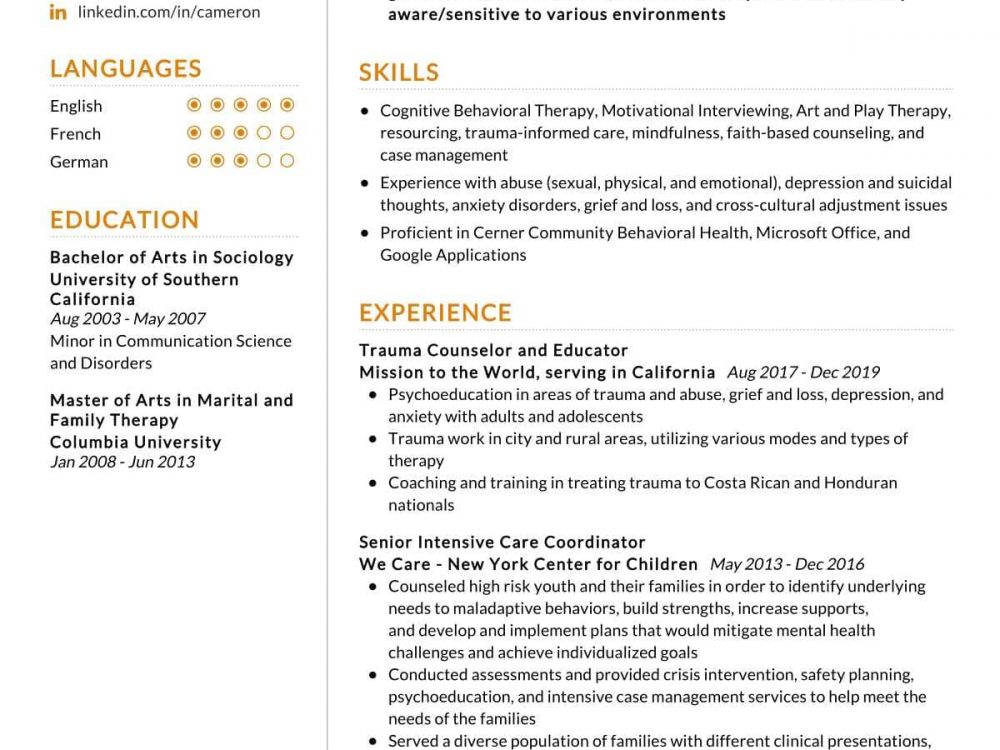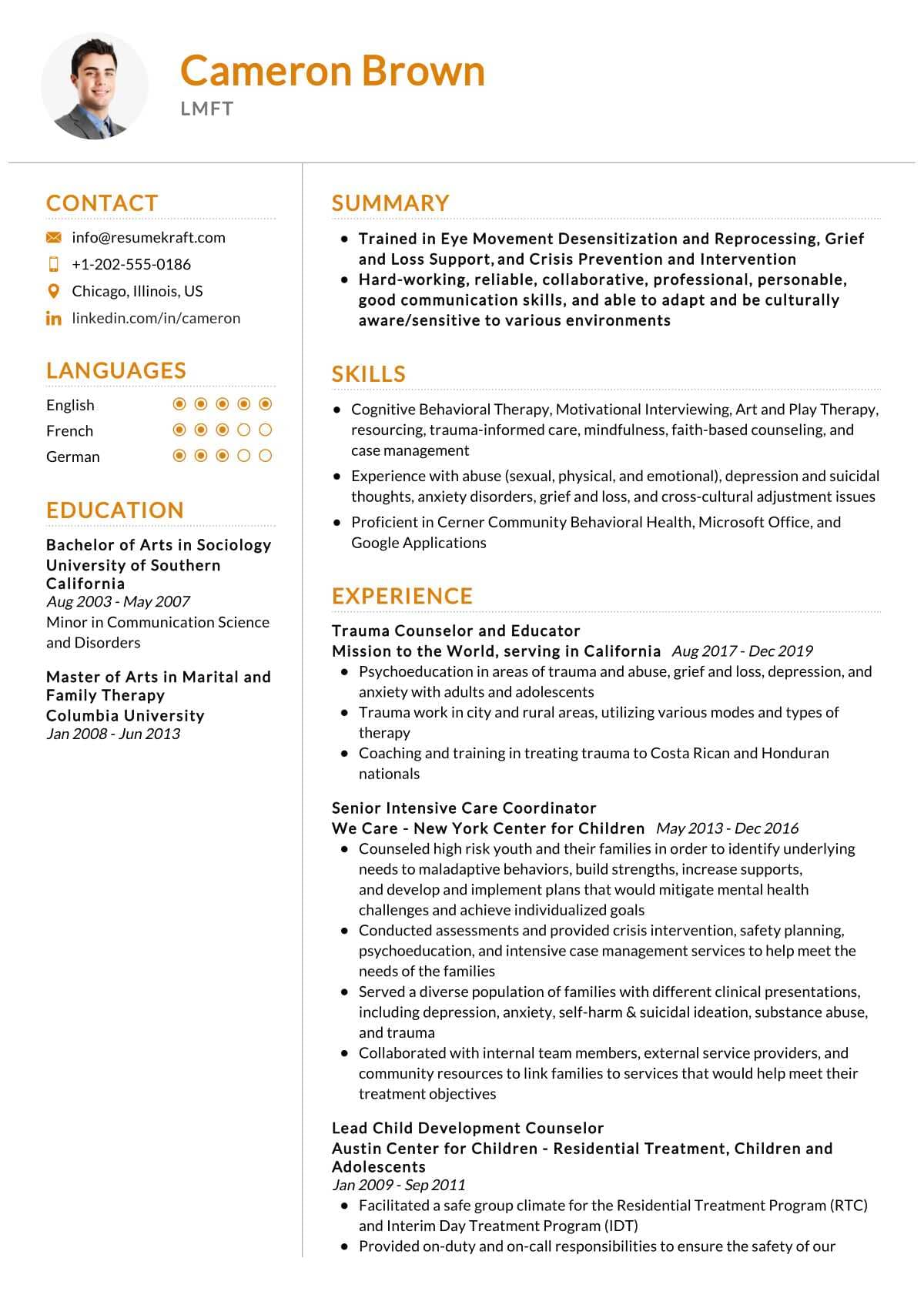What Should Be Included In A LMFT Resume?
When writing a resume for a Licensed Marriage and Family Therapist (LMFT) position, it is important to include all relevant information regarding your experience, qualifications, and qualifications to practice as a LMFT. A well-written resume should demonstrate your understanding of the profession and showcase your ability to help individuals, couples, and families in need.
When creating your resume for a LMFT position, it is important that you include your educational background, experience, and any specialized skills or knowledge you have acquired. Your educational background should include your degree, licensure, and any additional training or certifications. It is also important to list any LMFT-specific courses or workshops you have taken and any specialized knowledge or skills you have developed in the mental health field.
In addition to your educational background, your experience should be shown on your resume. This includes any clinical experience you may have had, such as internships, practicum placements, or volunteer work. Be sure to also include any professional experience you have had working as a LMFT, as well as any published works or additional training completed.
The last part of your LMFT resume should include any relevant awards or recognition you have received. This could include any awards or scholarships you have won, any professional recognition you have received, or any awards you have earned in academia or your profession. It is also important to note any professional organizations you are a member of, such as the American Association for Marriage and Family Therapy or the National Board of Certified Counselors. All of these details will demonstrate to employers your commitment to the profession and your dedication to helping others.
What Skills Should I Put On My Resume For LMFT?
When writing your LMFT resume, it’s important to highlight the skills that you have that make you an ideal candidate for the position. As an LMFT, you need to be knowledgeable in the areas of psychology, counseling, and social work. It’s also beneficial to demonstrate experience in dealing with clients and helping them to overcome their mental and emotional issues.
Some of the key skills you should include on your LMFT resume include:
- Knowledge of Diagnosis and Treatment of Mental Health Issues: As an LMFT, you should be well-versed in the diagnosis and treatment of mental health issues such as depression, anxiety, stress, and trauma.
- Ability to Facilitate Group Therapy: LMFTs often work with groups of people to give therapy. Being able to facilitate group therapy sessions with successful outcomes is an important skill to have.
- Crisis Intervention: Many LMFTs are called upon to help clients in crisis situations. Showing that you have the skills and knowledge necessary to help in these situations is essential.
- Conflict Resolution: As an LMFT, you need to be able to help clients find ways to resolve conflicts in their lives. Showing that you have sound conflict resolution skills on your resume can give you an edge over other applicants.
- Counseling Theory: LMFTs need to be able to apply various counseling theories to their work. Showing that you have a good grasp of counseling theory and its application can help you stand out.
- Writing Skills: Many LMFTs are required to write reports, treatment plans, and other documents. Showing that you have excellent writing skills is essential to securing a job as an LMFT.
What Is The Job Description Of The LMFT?
The Licensed Marriage and Family Therapist (LMFT) is a type of mental health professional that focuses on the family dynamic. They are specifically trained to help people and families navigate through difficult times. LMFTs help individuals of all ages, from children to adults, with a wide range of mental health issues. This can include depression, anxiety, relationship problems, anger management, trauma, substance abuse, and more. LMFTs also provide family counseling, which can help couples and families work through problems and improve their overall quality of life.
The job of an LMFT can vary depending on the context, but typically involves assessing, diagnosing, and treating individuals and families. LMFTs may provide individual or couples counseling, lead group therapy sessions, provide family therapy, and more. They may also help create and implement treatment plans, refer clients to other professionals, and provide crisis intervention when needed.
Having a well-written resume is an important part of the job search process for any LMFT. It’s essential to showcase your skills and experience, as well as highlight any specializations or certifications you have. The goal is to create a resume that will make you stand out in a crowded field and help you get the job you want.
What Is A Good Objective For A LMFT Resume?
A good objective for a LMFT resume should be focused on highlighting your key skills and strengths relevant to the position you are applying for. LMFT stands for Licensed Marriage and Family Therapist and is a type of mental health professional who specializes in providing therapeutic services to individuals, couples, and families. When writing a LMFT resume, it is important to craft an objective statement that will grab the hiring manager’s attention and demonstrate your qualifications and abilities.
When writing your objective, make sure you include any relevant education, experience, and skills you possess that make you a qualified LMFT. For example, you might mention that you are a licensed LMFT with specific experience working with couples or children. You could also speak to any specialized therapeutic training or certifications you have acquired and how they are applicable to the position. Additionally, it is important to let the hiring manager know that you are passionate about the work you do and that you are dedicated to providing quality care to clients.
In addition to highlighting your qualifications, you should also make sure to include key words related to your profession, such as “therapeutic counseling”, “mental health”, and “family therapy”. This will ensure that your resume is properly indexed by applicant tracking systems and help you stand out from other applicants.
By crafting a strong objective statement for your LMFT resume, you will be able to make a great first impression and show the hiring manager why you are the best candidate for the position.
What Are The Career Prospects In The LMFT?
A Licensed Marriage and Family Therapist (LMFT) is an in-demand professional who assists families, couples, and individuals in addressing their mental health and relationship issues. LMFTs are trained to promote healthy relationships, communication, and overall emotional well-being for families and couples. With their specialized approach to mental health, LMFTs can provide unique insight and guidance to those in need.
For those considering a career in LMFT, the field offers many opportunities for growth, challenge, and job satisfaction. LMFTs are in demand in many parts of the country, especially in areas with a high population of families and couples. LMFTs typically work in healthcare settings, such as hospitals, clinics, schools, and private practices, providing individual and/or couples counseling. In addition, LMFTs may also work in corporate settings offering on-site services or consulting.
LMFTs enjoy job security and the potential for growth in the field. Many LMFTs find themselves working in managerial and leadership positions within their organizations, and often the potential to increase their salaries and benefits is quite high. In addition, many LMFTs who practice in private settings may have the potential to earn higher salaries than those working in clinical settings.
For those interested in a career in LMFT, it is important to have the appropriate credentials and qualifications. Most states require LMFTs to be licensed in order to practice, and all LMFTs must complete a master’s degree in marriage and family therapy. Those looking to specialize in a certain area of practice, such as child therapy, may be required to complete additional training.
The career prospects for LMFTs are promising, and the demand for this field is growing . In addition to working in clinical settings, LMFTs may find themselves working in a variety of other settings, including schools, universities, corporations, private practices, hospices, and other health care facilities. LMFTs may also be employed in research, consulting, and advocacy roles. Furthermore, LMFTs may choose to specialize in certain areas of practice, such as gerontology, trauma, or grief counseling. With the right qualifications and training, LMFTs can open the door to a promising career in the mental health field.
Key Takeaways for an LMFT resume
Writing a resume for a career in the field of Licensed Marriage and Family Therapy (LMFT) can be a daunting task. However, with the right guidance, an LMFT professional can create an attractive resume that will showcase the best of their skills and experience. Here are some key takeaways for an LMFT resume:
First and foremost, it’s important to include detailed information about your credentials and educational background. This should include the degree, institution, and even the coursework relevant to LMFT. Additionally, any professional licensure, certification, or additional training should be highlighted.
Next, be sure to include any work experience or volunteer opportunities that you have been involved in that are related to the LMFT profession. This could include internships or other clinical positions. It’s important to highlight any relevant experience and be sure to note any supervisory or leadership roles you may have held.
Finally, don’t forget to include any special skills or qualifications that you may have. This could include any specialized therapeutic techniques you are familiar with, as well as any computer skills and other relevant abilities.
By following these key takeaways for an LMFT resume, you can ensure that you create a professional and compellng resume that will showcase your skills and experience and stand out from the competition.



